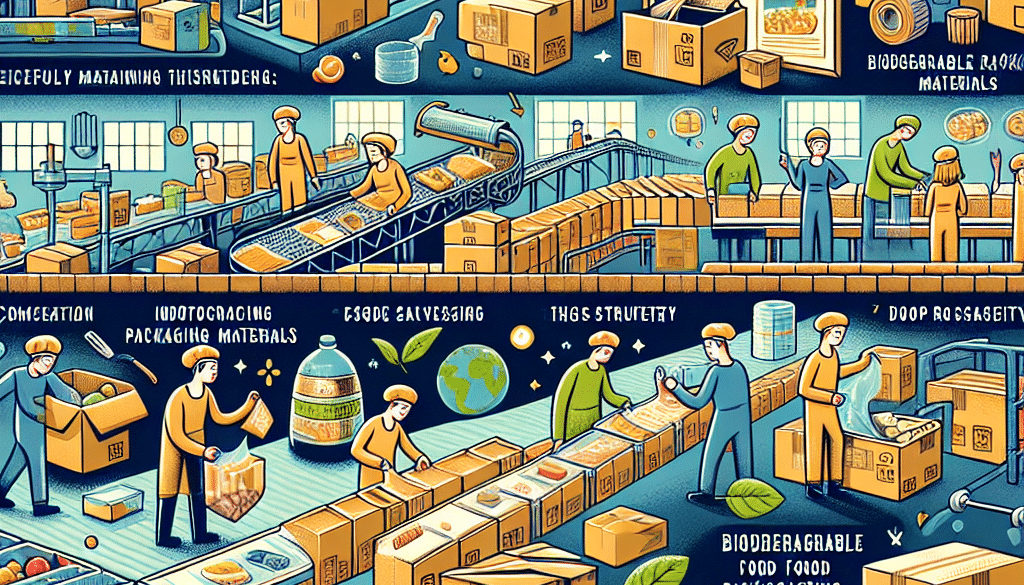Challenges And Considerations Of Food Packaging.
-
Table of Contents
- Food Packaging Challenges and Considerations: A Deep Dive
- Ensuring Food Safety and Integrity
- Extending Shelf Life and Reducing Food Waste
- Environmental Impact and Sustainability
- Consumer Convenience and Aesthetics
- Regulatory Compliance and Global Standards
- Technological Advancements and Innovation
- Conclusion: Balancing Multiple Objectives in Food Packaging
- ETprotein: Your Partner for High-Quality Protein Products
Food Packaging Challenges and Considerations: A Deep Dive

The world of food packaging is a complex one, with a myriad of challenges and considerations that manufacturers, retailers, and consumers must navigate. From ensuring food safety and extending shelf life to addressing environmental concerns and meeting regulatory requirements, the stakes are high in the packaging industry. This article explores the multifaceted landscape of food packaging, shedding light on the hurdles faced and the factors that must be weighed in the quest for effective and sustainable solutions.
Ensuring Food Safety and Integrity
At the forefront of food packaging considerations is the imperative to maintain food safety and integrity. Packaging must protect food from contamination, physical damage, and spoilage. This involves selecting materials that are not only robust and durable but also non-reactive and free from harmful chemicals. According to the Food and Drug Administration (FDA), packaging materials must comply with strict safety standards to prevent any risk to consumer health.
- Barrier protection against contaminants and microorganisms
- Resistance to temperature changes and environmental factors
- Prevention of chemical migration from packaging to food
Extending Shelf Life and Reducing Food Waste
Another critical challenge is extending the shelf life of food products. Innovative packaging solutions such as modified atmosphere packaging (MAP) and vacuum sealing have been developed to slow down the deterioration of food, thereby reducing food waste. The United Nations Food and Agriculture Organization (FAO) estimates that approximately one-third of all food produced for human consumption is lost or wasted. Effective packaging plays a pivotal role in tackling this global issue.
- Use of preservative technologies like MAP and vacuum sealing
- Incorporation of freshness indicators and time-temperature indicators
- Development of active packaging that interacts with food to extend shelf life
Environmental Impact and Sustainability
With increasing awareness of environmental issues, the sustainability of food packaging has come under scrutiny. The challenge lies in balancing functionality with eco-friendliness. Single-use plastics, for instance, are convenient but contribute significantly to pollution and are often not biodegradable. The Ellen MacArthur Foundation reports that by 2050, there could be more plastic than fish in the oceans by weight if current trends continue. As a result, there is a growing demand for packaging made from renewable resources, that is recyclable, compostable, or biodegradable.
- Reduction of packaging materials and use of lightweight alternatives
- Development of biodegradable and compostable packaging materials
- Implementation of recycling programs and circular economy principles
Consumer Convenience and Aesthetics
Consumer preferences also play a significant role in food packaging design. Packaging must not only be functional but also convenient and visually appealing. Features such as resealability, easy-open mechanisms, and portability add value for consumers. Moreover, the packaging is a key marketing tool, with its design and labeling playing a crucial role in brand recognition and purchase decisions.
- Incorporation of convenience features like zip locks and tear notches
- Attractive and informative labeling that complies with regulatory standards
- Use of clear packaging to showcase product quality
Regulatory Compliance and Global Standards
Food packaging is subject to a complex web of regulations that vary by country and region. Compliance with these regulations is non-negotiable, as failure to do so can result in legal repercussions and damage to a brand’s reputation. Packaging must meet food contact material regulations, labeling requirements, and international standards such as those set by the International Organization for Standardization (ISO).
- Adherence to FDA regulations for food contact substances in the United States
- Compliance with the European Union’s (EU) regulations on materials and articles intended to come into contact with food
- Understanding and implementing the ISO standards for packaging and the environment
Technological Advancements and Innovation
Technological advancements are continually shaping the food packaging industry. Innovations such as smart packaging, which incorporates sensors and indicators to monitor food conditions, are on the rise. Additionally, the use of nanotechnology in packaging materials can provide enhanced barrier properties and improve food safety. These technologies, however, must be thoroughly tested and proven safe for widespread use.
- Exploration of smart packaging solutions for real-time monitoring
- Investment in nanotechnology for improved packaging performance
- Adoption of digital printing techniques for cost-effective customization
Conclusion: Balancing Multiple Objectives in Food Packaging
In conclusion, the challenges and considerations of food packaging are numerous and diverse. Manufacturers must balance the need for food safety, shelf life extension, and consumer appeal with environmental sustainability and regulatory compliance. As the industry evolves, continuous innovation and adaptation will be key to meeting these complex demands. By addressing these challenges head-on, the food packaging sector can contribute to a more sustainable and efficient food system.
ETprotein: Your Partner for High-Quality Protein Products
In the context of food packaging, protein products require particular attention to maintain their nutritional value and quality. ETprotein is a company that stands out in the industry for its commitment to producing and supplying top-tier organic bulk vegan proteins and L-(+)-Ergothioneine (EGT). Their product range, which includes various plant-based proteins and EGT grades, is designed to meet the highest standards of quality and safety.
ETprotein’s offerings are ideal for businesses looking to incorporate high-quality protein into their packaged food products. With a focus on neutral taste, non-GMO, and allergen-free attributes, their proteins are suitable for a wide array of applications. Whether you’re in the nutraceutical, pharmaceutical, or food and beverage industry, ETprotein can provide the protein solutions you need to succeed in today’s competitive market.
About ETprotein:
ETprotein, a reputable protein and L-(+)-Ergothioneine (EGT) Chinese factory manufacturer and supplier, is renowned for producing, stocking, exporting, and delivering the highest quality organic bulk vegan proteins and L-(+)-Ergothioneine. They include Organic rice protein, clear rice protein, pea protein, clear pea protein, watermelon seed protein, pumpkin seed protein, sunflower seed protein, mung bean protein, peanut protein, and L-(+)-Ergothioneine EGT Pharmaceutical grade, L-(+)-Ergothioneine EGT food grade, L-(+)-Ergothioneine EGT cosmetic grade, L-(+)-Ergothioneine EGT reference grade and L-(+)-Ergothioneine EGT standard. Their offerings, characterized by a neutral taste, non-GMO, allergen-free attributes, with L-(+)-Ergothioneine purity over 98%, 99%, cater to a diverse range of industries. They serve nutraceutical, pharmaceutical, cosmeceutical, veterinary, as well as food and beverage finished product distributors, traders, and manufacturers across Europe, USA, Canada, Australia, Thailand, Japan, Korea, Brazil, and Chile, among others.
ETprotein specialization includes exporting and delivering tailor-made protein powder and finished nutritional supplements. Their extensive product range covers sectors like Food and Beverage, Sports Nutrition, Weight Management, Dietary Supplements, Health and Wellness Products, and Infant Formula, ensuring comprehensive solutions to meet all your protein needs.
As a trusted company by leading global food and beverage brands and Fortune 500 companies, ETprotein reinforces China’s reputation in the global arena. For more information or to sample their products, please contact them and email sales(at)ETprotein.com today.












